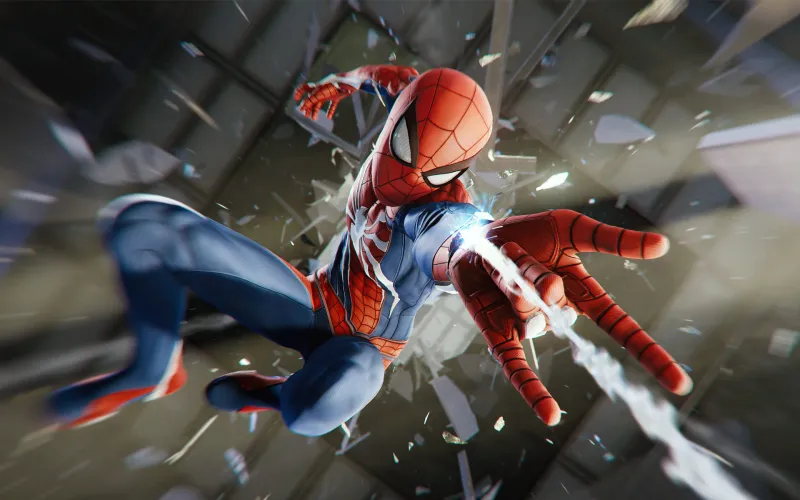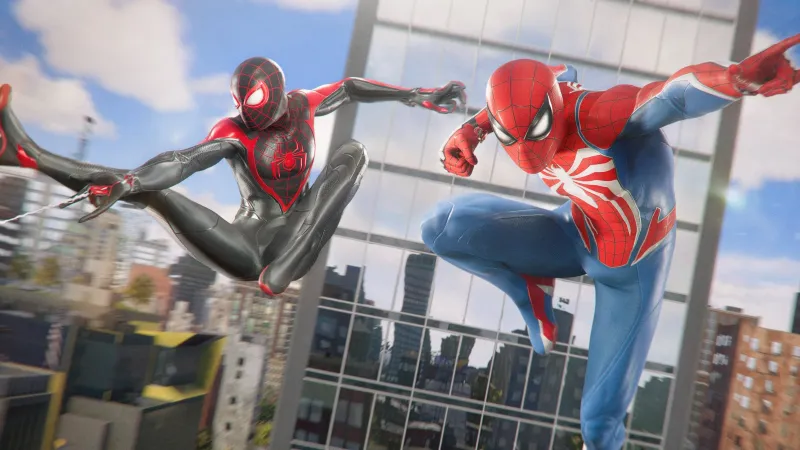


In 2008, Robert Downey Jr. debuted as Tony Stark in Iron Man. Outside of being an excellent movie in its own right, Iron Man proved to be one of the most influential films of the 21st century so far, paving the way to the biggest film and TV franchise of the last decade and a half, the Marvel Cinematic Universe (MCU). The post-credits sequence of Iron Man served as a teaser for what was to come, as Samuel L. Jackson's Nick Fury informed Stark that he was a part of a bigger universe.
At the time, "The Avenger Initiative" felt like a throwaway tease for something that would never happen (even for those involved in writing the scene), but films starring Captain America, Thor, and Hulk started building an unprecedented interconnectivity. Then, the announcement of the previously unthinkable: The Avengers. The 2012 film was one of the most anticipated of the year, but some worried it might be trying to manage too many moving parts. Too many plots. Too many superheroes. Too many superstars.
But it wasn't. In fact, the five movies that preceded it (Iron Man 1 and 2, The Incredible Hulk, Thor, and Captain America: The First Avenger) did enough heavy lifting with the characters and storytelling conventions that The Avengers could home in on the parts that mattered. The Avengers was a huge success and, to this day, serves as a case study for how to build an interconnected movie universe.

While others have tried to do the same across various other media, few have succeeded at all, and none have succeeded in the way Marvel has. So it would stand to reason that when Marvel decided to devote more resources to its gaming division, it would know the best way to go about building a strong universe. We certainly got that sense from one of the earliest hits during the company's gaming resurgence, Marvel's Spider-Man. That 2018 title by Insomniac kept several plates spinning over the course of its fantastic narrative, balancing new twists on iconic heroes, villains, and storylines that fans of the web-slinger have come to intimately know over decades of adoration.
In stark contrast to the MCU's approach with Spider-Man (which I also love), I was happy to have a video game series where Peter Parker – and eventually Miles Morales – were simply friendly neighborhood Spider-Men. However, following 2019's incredible climax to the MCU's Infinity Saga in Avengers: Endgame, I was itching for a gaming equivalent. Just over a year later, in 2020, we received Marvel's Avengers from Crystal Dynamics. I enjoyed the single-player content for what it was, but I couldn't help but feel that it seemed to not learn from the successful build Marvel's film division experienced with the MCU.

Marvel's Spider-Man was full of lovingly placed references and Easter eggs to a larger universe (including a comment from Spidey that the Avengers were out on the West Coast – the setting for Marvel's Avengers), but the Avengers game takes place in a different universe entirely. And that's fine. But why rush into an Avengers story when the games could have built up to that moment? It felt unearned and rushed; why should I care about this version of Tony Stark or Thor? But the lack of a pre-existing foundational building block was the least of that game's problems.
Insomniac's first Spider-Man game nailed so much about what players want from a superhero game. It's a self-contained, single-player story with ever-evolving gameplay, a massive playground to explore, and no live-service plan that banks on highly dedicated players that will spend money on microtransactions to keep the game profitable. No, Spider-Man was the antithesis of games like that, and in doing so, it remains relevant more than five years later, even as its sequels soared to even greater heights. And it accomplished all of that while still building a universe; it felt worthy of and in line with the legacy of the MCU's first three Phases. Marvel's Avengers, meanwhile, was unfocused, mismanaged, and, in its worst moments, felt like a microtransaction-riddled cash grab.
While there's plenty to be said about what Spider-Man, Spider-Man: Miles Morales, and, now, Spider-Man 2 did right that Avengers did wrong, it didn't all click with me until this past weekend as I put the finishing touches on the main story of Spider-Man 2. I understand Marvel's Avengers was developed in parallel with Marvel's Spider-Man (Avengers was announced in 2017, more than a year and a half before Spider-Man launched), and hindsight is always 20/20, but it has never been clearer to me that Marvel's Spider-Man should have become the blueprint for Marvel games going forward.

Warning: I will be discussing brief spoilers for Marvel's Spider-Man 2 in the following two paragraphs.
This is true for how the story is told, how the characters are developed, and how the universe feels, but perhaps most importantly, it's true for how the game plays. Insomniac has nailed every aspect of how the dueling wall-crawlers swing and fight through New York, and though I do believe a lot of that is transferrable to other heroes, it's some of the key parts of Spider-Man 2 that truly hammered this home. New abilities, like Peter's Symbiote powers or both Spider-Men's gliding ability, are directly adaptable to other characters. Why couldn't some of that core gameplay transfer to Iron Man or Doctor Strange?
But on a more specific level, the section of Spider-Man 2 where you play as Venom told me that a great Incredible Hulk game has never been more achievable. You truly feel like an unstoppable force as you rampage through the linear but extremely satisfying sequence. If Insomniac can capture that in a brief, one-off gameplay section, imagine what a talented team building off that foundation could do with a full game.
And that's one of the key detractors of my argument: Insomniac can't possibly develop every Marvel game; it's impossible from so many different angles, but perhaps chief among them is that if the studio ballooned to a size that would allow for more releases using this blueprint, the quality would almost certainly dilute, and the increased frequency would mean games like the three Spider-Man titles we've received so far would cease to feel as special. But that's where licensor/publisher Marvel Games comes into play.

When the Marvel Cinematic Universe was experiencing its heyday, what made each film so interesting was that while Marvel Studios oversaw the production and guided the creation of the film to build toward the greater, overarching narrative of the MCU, the creators were able to craft a film with its own unique flavor. They all felt distinctly like Marvel superhero movies, even as they often existed within different subgenres. I loved that Thor could be a fantastical movie about Norse gods battling it out in space, and then we could go on an espionage thrill ride with Captain America in The Winter Soldier before the leads of those films teamed up to battle Ultron in a quintessential summer popcorn blockbuster.
Marvel Games should aim to replicate – at least in proxy – what Marvel Studios accomplished. If it wants to create a universe or a team-up game, it should look no further than how Marvel Studios approached that same task. Marvel Studios served as the central organizing principle for the architecture of the MCU, even as those creators crafted their stepping stones through their own lenses. People became not only Iron Man fans or Captain America fans – they became Marvel fans. They saw each movie in anticipation of the next, and the slow build allowed for the satisfying payoff we received with each new Avengers title.
It makes perfect sense to farm Marvel's latest push into the gaming space out to some of the best development studios like Crystal Dynamics, Firaxis, and Eidos-Montréal. It's great that these creators can apply their different genre expertise to Marvel's stable of heroes, but like the film side of the company, these games still need to feel in line with their counterparts. Some, like Midnight Suns and Guardians of the Galaxy, accomplished that better than others. However, when Marvel's Avengers, a game featuring some of the most iconic characters in pop culture, failed to capture a lasting audience, I hope it served as a wake-up call to Marvel Games as much as the Spider-Man franchise's success has. Spider-Man so perfectly laid the blueprint, much in the way the Batman Arkham series did more than a decade ago, so why not use it?

Marvel Studios, in its best days, focused on creating a great movie first and a universe second. The universe doesn't exist without great movies, and if Marvel Games wants to further establish itself as a juggernaut within the gaming space, it should, at the very least, look at why its film division accomplished all it has. Not everything needs to be a universe, but if Marvel wants it, the foundation is there. It's perfectly okay for these games to live on their own – after all, the universe-first mentality backfires far more often than it succeeds; look no further than the MCU's fourth Phase.
But much in the way Iron Man succeeded in laying a foundation by translating characters that feel ripped straight from the pages of our favorite comic books, Insomniac's Spider-Man series excels at bringing these characters to life by placing them in heartfelt stories, understanding how to put an authentic interpretation of their power-sets in the palm of our hands, and creating a world that feels much larger than it actually is. The movies that followed Iron Man didn't feel like Iron Man rip-offs, but the filmmakers demonstrated a clear understanding of what made that first MCU movie so successful. In that same way, even if Marvel Games doesn't want to create an interconnected universe that spans several games and development studios, it should still take some cues from Marvel Studios. Marvel Games should serve as that organizing principle that oversees these games as they are pitched and developed to ensure they are operating with a full understanding of why games like Marvel's Spider-Man succeeded when Marvel's Avengers failed. Even if it's not a direct successor to Spider-Man, it should feel like a spiritual one.
We already know a new Wolverine game from the studio that brought us Spider-Man is on the way, as well as an Iron Man game from Motive Studios, a Black Panther/Captain America title from Skydance New Media, and another Black Panther game from EA. We don't know if those will be connected in any way to the Spider-Man games, but regardless, if they learn the lessons of what to do and what not to do from Spider-Man and Avengers, respectively, it will feel like a massive step in the right direction for the Marvel video games that exist outside of Insomniac's Spider-Verse. And then, maybe the next time we get an Avengers video game, it will receive the build-up Earth's Mightiest Heroes deserve.
To read why Marvel's Spider-Man 2 is so successful, be sure to check out our review here.

Explore your favorite games in premium print format, delivered to your door.